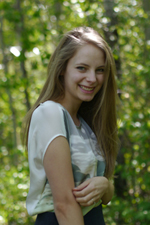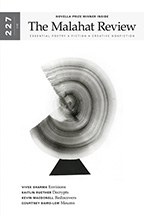The Past Rendered Anew:
Karyn Wisselink in Conversation
with Michael Prior

Editorial Assistant Karyn Wisselink interviewed Michael Prior on his upcoming poetry contributions to Issue #186, Spring 2014: "The Patagonian Hare," "Successful Muskrat Farming," and "Mole Catching: A Practical Guide."
Want a sneak peek at Issue #186? Read "The Patagonian Hare" on our website.
Michael was a finalist for both the 2013 Long Poem Prize and the 2014 Open Season Award for Poetry.
“The Patagonian Hare” is charged with references to the Second World War. Can you introduce Benjamin Murmelstein to us?
Murmelstein is a controversial figure, to say the least. He features prominently in Claude Lanzmann’s film The Last of the Unjust. He was an Austrian rabbi and scholar during the Second World War, and became one of the community leaders in the Theresienstadt ghetto. He and other elders negotiated with the Nazis in what they explain was an attempt to prevent as much suffering as possible. Murmelstein has been described both as a leader doing his best in a hopeless situation, and as a Nazi collaborator. The poem’s title comes from Lanzmann’s autobiography, which recounts his own involvement in the French Resistance and his work documenting the Holocaust.
Do you find much of your inspiration comes from history? Do you find it important to recall history in literature?
I do find much of my inspiration in history—oftentimes with figures like Murmelstein who inhabit a murky area precluding any sort of ultimate consensus.
Lately, I’ve been interested in the social importance of attempting to re-witness history through art. Kyo Maclear writes that, in its attempts to re-witness, the salience of art “rests in its potential to represent the past in the moment of articulating something new,” and I’m inclined to agree. The ethical importance that Maclear attaches to an artistic historical attentiveness is, I hope, always in the back of my mind. In fact, a large portion of my thesis project traces my grandparents’ lives in the years directly after their internment as Japanese-Canadians during the Second World War.
The forthcoming trio of poems is linked by references to small animals in their titles. Was this intentional, and is there a larger significance behind it?
There wasn’t any conscious thematic intent, though there is a sort of shared intertextual component behind them, as all three take their titles from books. (It’s hard to resist writing a poem when you come across a phrase like “Successful Muskrat Farming!”) I do think all the poems contain a recurring interest in the way animals in poetry become a means of self-explanation.
Can you describe your writing process? How do you achieve the exquisite personification of characters such as the mole in “Mole Catching: A Practical Guide”?
Unfortunately, with my current schoolwork and TAships, the process is simply to write whenever and wherever I can, because I don’t have much time. As for the ways in which poems accrue, I don’t think I’m different from other writers: usually a line or title pops into my head and it expands with time and thought. Sometimes if I’m lucky, a more complete idea occurs and I just have to find a way to reverse-engineer it onto the page.
You recently moved from the beautiful West Coast to pursue an M.A. at the University of Toronto (where you also work as a poetry editor for Echolocation magazine). How has this influenced the trajectory of your writing career? Do you feel that moving across the country has affected the content of your writing?
I’m glad you snuck that adjective in there about the West Coast! In terms of the relocation’s influence on my “career,” I think the move has been a positive one. The Creative Writing M.A. at U of T has some really wonderful faculty, and I’ve met a lot of talented writers. I’m not sure if the move has influenced the content of my writing; perhaps it’s too early to tell. As it is, I find myself returning to the same fascinations I have always had. Though I suppose now I can write with greater clarity about ice storms and fearless cyclists.

Karyn Wisselink
* * * * * * * *









